Oct 1, 2018 | Focolare Worldwide
More than 1,200 cadavers have been recovered following an earthquake and tsunami that hit the island of Sulawesi. The Vatican is reporting that “1, 203 bodies have been recovered, but some have not yet been found or identified,” says Insan Nurrohman, vice president of Aksi Cepat Tanggap, one of the principal Indonesian NGOs. Rescue workers are labouring around the clock. Managing to remove people who are still alive is very delicate work. “The government is sending in bulldozers to clear the areas,” says Matteo Amogoni, who is in charge of Caritas Italy for Indonesia and Philippines, “but there is also the problem of no electricity and petrol. At the Angelus, Pope Francis said: “I pray for the deceased, who are unfortunately many, for the wounded and for those who have lost home and work. May the Lord console those who have survived and provide those involved in the rescue effort with strength.”
Sep 30, 2018 | Non categorizzato
“You who have gone through so many seasons are the living testimony of constancy in adversity, but also of the gift of prophecy that reminds the young generations that the care and protection of the ones who preceded them are gratifying and appreciated by God, and that they cry out to God when they are disregarded.” When Pope Francis spoke these words last September 24th, he was speaking to the elderly audience in front of him in the Cathedral of Saint James in Riga (Republic of Latvia). But he was also speaking to the elderly of the whole world, in view of the international day dedicated to them on October 1st. “You that have spent yourselves, body and soul, that have given your life in the pursuit of freedom for your country, are now often left feeling that you have been forgotten. Although it sounds paradoxical in today’s world, in the name of freedom, free people subject the elderly to solitude, ostracism, lack of resources, esclusion and even misery. […] You that have gone through many seasons, never forget that you are the roots of a people.”
Sep 30, 2018 | Non categorizzato
Hope I never would have thought that our parents would separate. But when it happened, and we were faced with an uncertain future that was completely unknown and the fact that life would never be the same again, I began having many sad and confused thoughts. We three brothers stayed with our Mum,“Our super-Mum,” as we called her. But everything was different. Even though we never had problems at school before, now we were beginning to have them. As soon as we noticed it, we began trying to give her some joy. Living with Papa wasn’t easy, but ever since we were small, our parents and grandparents had taught us not to judge. One of our nicest times together is when we gather to pray, asking God to accomplish his plan for each one of us. J. P. L. – Colombia Difficult Student Many years ago a particularly difficult student arrived in my class, because of some family problem. Since he had violent outbursts, some of the other parents protested with the director. Faced with the possibility that he might be expelled, I obtained permiission to take him into my personal care, advising my colleagues of the situation and receiving help from the students.Simultaneously, a family of friends made contact with his parents to help them until their situation was worked out. A long time later I returned to that city, which I hadn’t been to in many years. I saw my student again, now all grown and turned into the proud father of a family. T. M. – Italy Cake One of our neighbors was opposed to the restructuring work we were doing on our little house, expressing objections that were obviously unjustified. Tired of receiving his letters and protestations, my husband consulted a lawyer with the thought of bringing a case against him. But then, as we talked abou it, we decided on another path which seemed to be suggested by our heart. We would try to create a bridge between us and him. I baked a cake and we went to see him. He asked: “How did you ever know that today was our daughter’s birthday?” The expected clash had been transformed into an encounter. A few days later they visited us and now we have some new friends. M. – Spain The Wall Seven years of marriage had not led to the desired union of our hearts. Sand and discouraged, we thought that the reason was immaturity and incomptability of character. In this atmosphere we were led to judge and the wall of non-communication between us had grown higher and higher. Moreover, we were also burdened with feelings of guilt for not having been able to convey to our children the love that a husband and wife should give witness to. When we had already given up, some friends sho live the Gospel helped us to break down that wall. Also, there were signals coming from my wife that made me very hopeful. We learned to accept one another, to say sorry when we failed, to see look upon each other as a gift and to consider our failures as an opportunity to begin again. Helped by the friendship and prayers of others, we could feel that God loved us and had kept our family going. L. – Italy
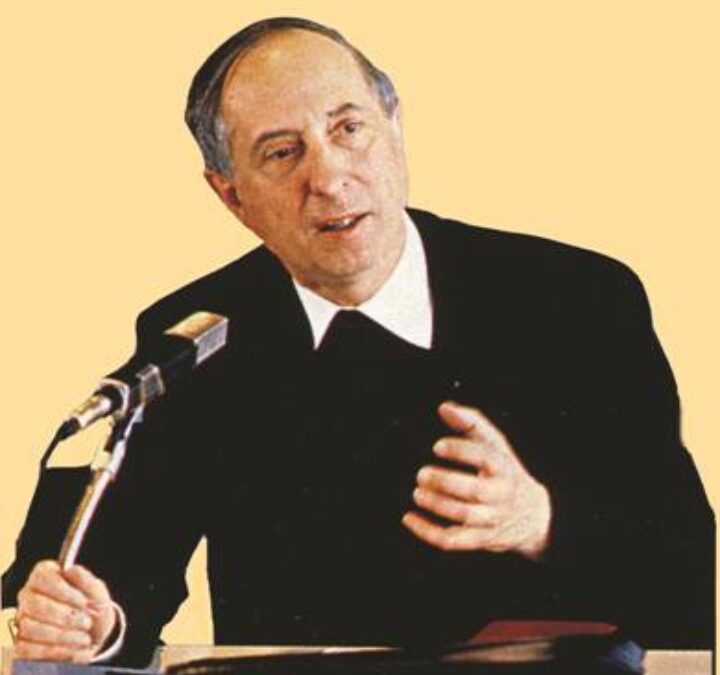
Sep 28, 2018 | Non categorizzato
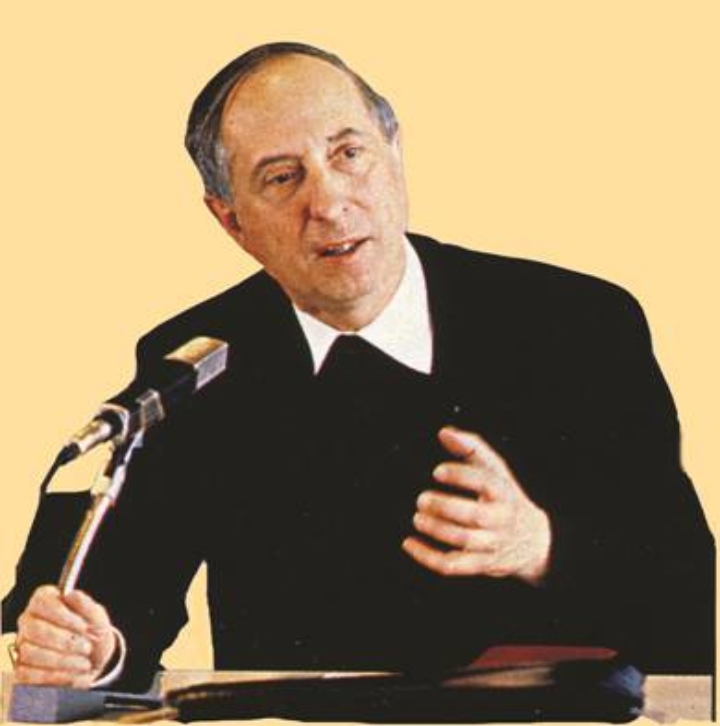 “Whatever you did to one of the least of these brothers and sisters of mine, you did it to me” (Mt 26:40). This sentence from the Gospel is the most definitive word on what a human being is. This definition is no less scandalous than Jesus declaring himself Son of God. In the name of their personal freedom, identity and uniqueness, human beings think that they have a right to contest the fact that they are so identified with Jesus Christ. Human beings want to be loved for themselves, for who they are, and not to be degraded as some sort of mask for Jesus. Human beings fear that the “bit more” of love that they receive out of love for Jesus might not take them into account, might rob them of the love they need and desire for themselves. But who could neglect their neighbours while trying to love Jesus in them (and in this way also neglect Jesus)? And who could claim that acknowledging the presence of Jesus in others means diminishing their human dignity; in that case they have not understood the presence of Jesus in their neighbours. Since Jesus has identified himself with humankind – God himself who is Love – he has also identified himself with every individual human being. But love is never an affirmation of oneself that consumes and annihilates others. It’s something that gives of itself, and, in its self-giving, provides others with the freedom to be themselves. Jesus never leaves me alone. He is on my side, he accepts me just as I am, and whatever concerns me, also concerns Him. I remain myself. Indeed, I become my fullest self precisely because I never remain alone. The mystery of Christ is the mystery of every human being. What does this mean for the people I meet, and what does it mean for me and my life? For what regards other people, it means that I am never dealing merely with a link in the chain, a cog in the wheel, or just a number in the huge numbers of people that exist. Each time I look upon a human face, I meet God in his unconditioned state, I encounter that voice that still declares over the face of every human being, what was said of Jesus during the Transfiguration on that mountaintop: “This is my beloved son!” (Mk 9:7). There are no exceptions… A human cannot rob itself of its ultimate reality. Whether he is a criminal or a scoundrel, I can never again write him off as a lost case. I encounter Christ in every person not because the person is good or deserving, not even because he or she draws upon the divine light in their personal lives, but because God has irrevocably adopted them as his own sons and daughters. Certainly the human being is immense because of the Divine life that he and she have let into their souls because of their personal choice to believe, which took place in baptism in the name of Jesus. Belonging to Jesus is something “automatic.” When a person is born, Christ has already assumed into himself that person’s living and dying, fault and self-inflicted wounds: everything is assumed into the life and death of Christ who gave his life for each one of us. This is why we encounter Jesus in every human being. And we encounter him in a particular way in the least, in those who seem to be farthest from Him, in the people in whom his face seems to be most overshadowed. Why? Because on the cross, during his abandonment by God, even becoming sin (2 Cor 5:21), Jesus identified himself with what is farthest from God, what seems most opposed to God. [It is only by] discovering Christ in our neighbours and giving to each of them that human love with which you turn towards every neighbour, with an indivisible love that is therefore directed to Christ himself, that will enable every neighbour to discover his and her own identity with Jesus, their own nearness to Jesus, being completely assumed by Him.” (From “Offene Weltformel”, by Klaus Hemmerle, Neue Stadt, 1970)
“Whatever you did to one of the least of these brothers and sisters of mine, you did it to me” (Mt 26:40). This sentence from the Gospel is the most definitive word on what a human being is. This definition is no less scandalous than Jesus declaring himself Son of God. In the name of their personal freedom, identity and uniqueness, human beings think that they have a right to contest the fact that they are so identified with Jesus Christ. Human beings want to be loved for themselves, for who they are, and not to be degraded as some sort of mask for Jesus. Human beings fear that the “bit more” of love that they receive out of love for Jesus might not take them into account, might rob them of the love they need and desire for themselves. But who could neglect their neighbours while trying to love Jesus in them (and in this way also neglect Jesus)? And who could claim that acknowledging the presence of Jesus in others means diminishing their human dignity; in that case they have not understood the presence of Jesus in their neighbours. Since Jesus has identified himself with humankind – God himself who is Love – he has also identified himself with every individual human being. But love is never an affirmation of oneself that consumes and annihilates others. It’s something that gives of itself, and, in its self-giving, provides others with the freedom to be themselves. Jesus never leaves me alone. He is on my side, he accepts me just as I am, and whatever concerns me, also concerns Him. I remain myself. Indeed, I become my fullest self precisely because I never remain alone. The mystery of Christ is the mystery of every human being. What does this mean for the people I meet, and what does it mean for me and my life? For what regards other people, it means that I am never dealing merely with a link in the chain, a cog in the wheel, or just a number in the huge numbers of people that exist. Each time I look upon a human face, I meet God in his unconditioned state, I encounter that voice that still declares over the face of every human being, what was said of Jesus during the Transfiguration on that mountaintop: “This is my beloved son!” (Mk 9:7). There are no exceptions… A human cannot rob itself of its ultimate reality. Whether he is a criminal or a scoundrel, I can never again write him off as a lost case. I encounter Christ in every person not because the person is good or deserving, not even because he or she draws upon the divine light in their personal lives, but because God has irrevocably adopted them as his own sons and daughters. Certainly the human being is immense because of the Divine life that he and she have let into their souls because of their personal choice to believe, which took place in baptism in the name of Jesus. Belonging to Jesus is something “automatic.” When a person is born, Christ has already assumed into himself that person’s living and dying, fault and self-inflicted wounds: everything is assumed into the life and death of Christ who gave his life for each one of us. This is why we encounter Jesus in every human being. And we encounter him in a particular way in the least, in those who seem to be farthest from Him, in the people in whom his face seems to be most overshadowed. Why? Because on the cross, during his abandonment by God, even becoming sin (2 Cor 5:21), Jesus identified himself with what is farthest from God, what seems most opposed to God. [It is only by] discovering Christ in our neighbours and giving to each of them that human love with which you turn towards every neighbour, with an indivisible love that is therefore directed to Christ himself, that will enable every neighbour to discover his and her own identity with Jesus, their own nearness to Jesus, being completely assumed by Him.” (From “Offene Weltformel”, by Klaus Hemmerle, Neue Stadt, 1970)
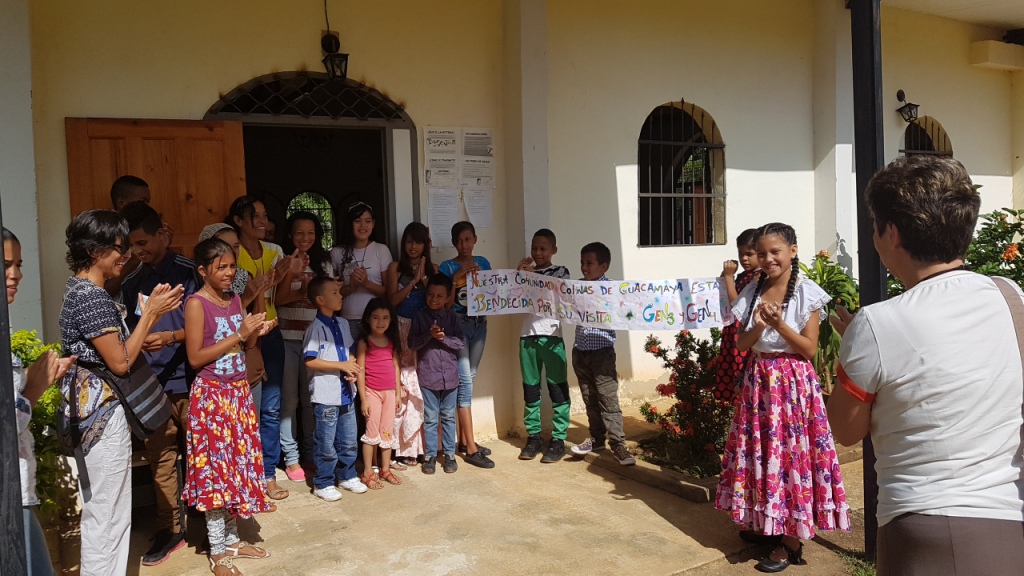
Sep 27, 2018 | Focolare Worldwide
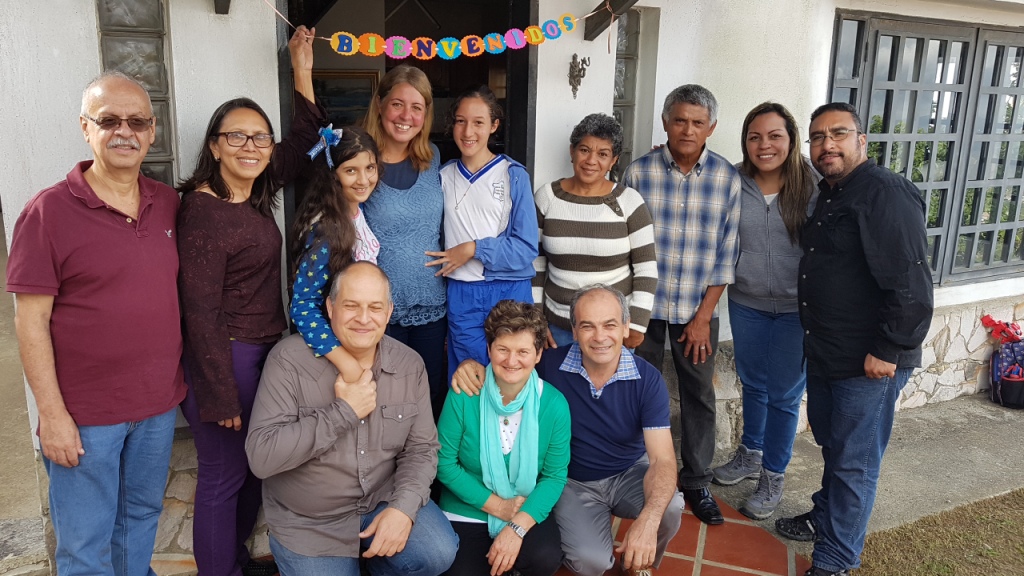 Families scattered, poverty, extreme insecurity, rising costs, lack of food, public transport, electricity and running water…an entire country in crisis that seemed to be expressed in the prayer of Grace before the first supper that Agostino and Marisa shared in the land of Venezuela: “Lord, thank you that we were able to find this food to share.” “We had planned a meeting with families, first at the Mariapolis Centre near Caracas and, then, in Valencia and Maracaibo. Emeris and Oscar accompanied us and allowed us to participate in their life.” Agostino and Marisa had lived for many years in Santo Domingo, and now they find themselves re-living their experience of poverty, suffering and separation from relatives that forced them to emigrate. It was the same experience of thousands and thousands of Italians who had fled in the aftermath of the Second World War. They had boarded ships with luggage made of cardboard. “For decades the Venezuelan people have welcomed immigrants and now finds itself also forced to emigrate. From wealth and security to extreme insecurity. They said: ‘We were well-off, surrounded by abundance, but we never knew until now how precious it all was. The crisis is the greatest blessing for people and nations, because it leads to progress. Creativity is born from despair as day is born from a dark night, said Albert Einstein in 1931.’ “It took courage to hear those words,” that were spoken in a video produced by the Focolare’s New Families Movement. The families asked to see it again the next day. They told us: ‘You had lived in Santo Domingo and in Cuba so that you could help us here today.’ This economic crisis opened our eyes to the needs of our neighbors.”
Families scattered, poverty, extreme insecurity, rising costs, lack of food, public transport, electricity and running water…an entire country in crisis that seemed to be expressed in the prayer of Grace before the first supper that Agostino and Marisa shared in the land of Venezuela: “Lord, thank you that we were able to find this food to share.” “We had planned a meeting with families, first at the Mariapolis Centre near Caracas and, then, in Valencia and Maracaibo. Emeris and Oscar accompanied us and allowed us to participate in their life.” Agostino and Marisa had lived for many years in Santo Domingo, and now they find themselves re-living their experience of poverty, suffering and separation from relatives that forced them to emigrate. It was the same experience of thousands and thousands of Italians who had fled in the aftermath of the Second World War. They had boarded ships with luggage made of cardboard. “For decades the Venezuelan people have welcomed immigrants and now finds itself also forced to emigrate. From wealth and security to extreme insecurity. They said: ‘We were well-off, surrounded by abundance, but we never knew until now how precious it all was. The crisis is the greatest blessing for people and nations, because it leads to progress. Creativity is born from despair as day is born from a dark night, said Albert Einstein in 1931.’ “It took courage to hear those words,” that were spoken in a video produced by the Focolare’s New Families Movement. The families asked to see it again the next day. They told us: ‘You had lived in Santo Domingo and in Cuba so that you could help us here today.’ This economic crisis opened our eyes to the needs of our neighbors.” 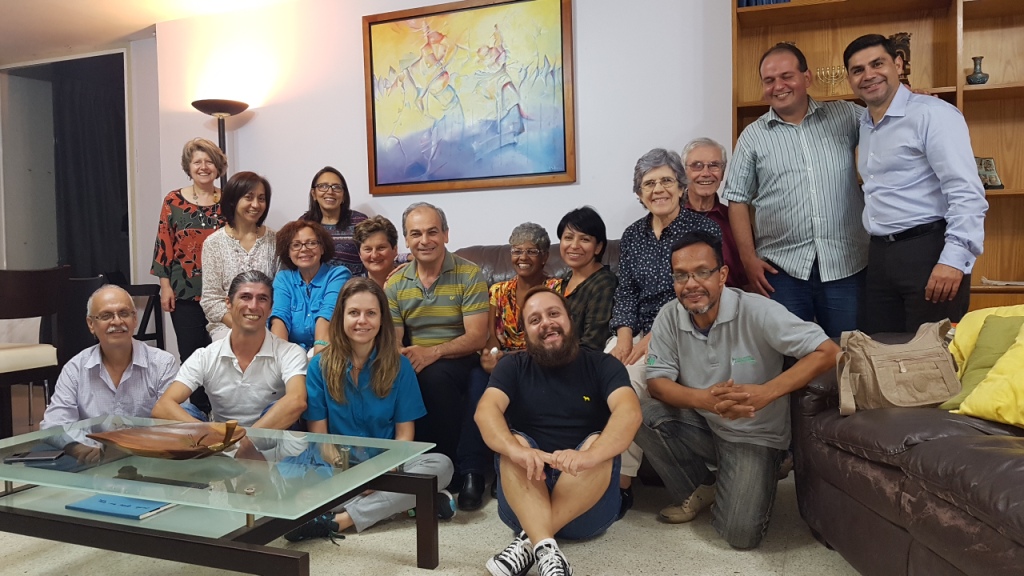 We had a tight schedule in Caracas as the visit went on: “conversations, lunches and dinners with families. They took turns coming to Emeris’ and Oscar’s home. We shared an experience with them that had proven fundamental for us. Having to decide where to live and having completely different ways of thinking, one night, we made a pact to embrace the other’s desires as our own. It suddenly appeared as an unexpected solution that contained all the elements that were important for each of us, but it was novel, a fruit of mutual love.” They recounted: “Many families have a car, but it’s becoming more and more difficult to repair maintain them, both because of the cost and the lack of professional mechanics who are fleeing the country. And the worn out tires are a big problem. A few days later we bought two of the four tires, using the money we had saved for groceries. We put them on the car and were able to keep travelling.”
We had a tight schedule in Caracas as the visit went on: “conversations, lunches and dinners with families. They took turns coming to Emeris’ and Oscar’s home. We shared an experience with them that had proven fundamental for us. Having to decide where to live and having completely different ways of thinking, one night, we made a pact to embrace the other’s desires as our own. It suddenly appeared as an unexpected solution that contained all the elements that were important for each of us, but it was novel, a fruit of mutual love.” They recounted: “Many families have a car, but it’s becoming more and more difficult to repair maintain them, both because of the cost and the lack of professional mechanics who are fleeing the country. And the worn out tires are a big problem. A few days later we bought two of the four tires, using the money we had saved for groceries. We put them on the car and were able to keep travelling.”  Two hours from Caracas the people of Valencia were suffering lack of water and the difficulty in transport. “In a rural town, Guacamaya, we met the community that had first been in touch with Ofelia who was forced to leave. They decided to find a way to carry on without having to leave their home” There were also quite a few young people “like sponges absorbing everything.” Two days later the trip to Maracaibo was in jeopardy because of the inspection stops on the roadway. But everything went well. Without electric current everything was more difficult: the terrible heat and the impossibility of turning on the air-conditioners, the lack of internet and entire programmes that just had to be cancelled. The night we were supposed to return to the city, so a supper was awaiting us with two families, that night at another family and breakfast with still another family in order not to be a financial burden on anyone. On the way, the road was blocked by a group of demonstrators which forced us to turn around. The family that took us in didn’t have anything for supper. We took some pasta out of our suitcases and cooked ourselves. It was a very beautiful evening. Incredibly, there was electric power that allowed us to sleep that night. The next day, arriving in Maracaibo, we learned that there was no electricity and the change in programme came as quite a relief for everyone.” They also recounted: “”On the morning of the meeting with the community, public transport was scarce and there were long queues for refuelling. The family that had organized everything arrived after quite a long adventure. Their daughter had proposed that they pray for a vehicle that would take them the rest of the way and, shortly afterwards, a car stopped and offered them a ride.” This too is Venezuela.
Two hours from Caracas the people of Valencia were suffering lack of water and the difficulty in transport. “In a rural town, Guacamaya, we met the community that had first been in touch with Ofelia who was forced to leave. They decided to find a way to carry on without having to leave their home” There were also quite a few young people “like sponges absorbing everything.” Two days later the trip to Maracaibo was in jeopardy because of the inspection stops on the roadway. But everything went well. Without electric current everything was more difficult: the terrible heat and the impossibility of turning on the air-conditioners, the lack of internet and entire programmes that just had to be cancelled. The night we were supposed to return to the city, so a supper was awaiting us with two families, that night at another family and breakfast with still another family in order not to be a financial burden on anyone. On the way, the road was blocked by a group of demonstrators which forced us to turn around. The family that took us in didn’t have anything for supper. We took some pasta out of our suitcases and cooked ourselves. It was a very beautiful evening. Incredibly, there was electric power that allowed us to sleep that night. The next day, arriving in Maracaibo, we learned that there was no electricity and the change in programme came as quite a relief for everyone.” They also recounted: “”On the morning of the meeting with the community, public transport was scarce and there were long queues for refuelling. The family that had organized everything arrived after quite a long adventure. Their daughter had proposed that they pray for a vehicle that would take them the rest of the way and, shortly afterwards, a car stopped and offered them a ride.” This too is Venezuela.
Sep 27, 2018 | Focolare Worldwide
The Holy See diffused a new message, with the invitation to “proceed with confidence, courage and foresight, with the dialogue long pursued” with the People’s Republic of China, “in order to grow in authentic friendship.” The recent agreement between the Holy See and the People’s Republic of China, signed a few days ago in Beijing– an agreement that unlocked the nomination of bishops and ratified the “readmission” to full communion with Rome of eight “official” bishops – is opening a new page of friendship which has now resolved the conflicts of the past. China and the Apostolic See – Pope Francis said in his message – “are called upon by history to an arduous but challenging task, so they may act more positively for the orderly and harmonic growth of the Catholic community in China and promote the integral development of society, ensuring greater respect for the human being also in the religious field,” and lastly, that “they shall work concretely to protect the environment in which we live and edify a future of peace and brotherhood between peoples.”
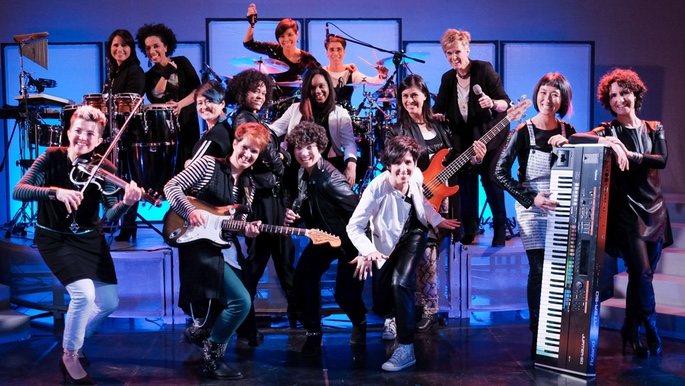
Sep 27, 2018 | Non categorizzato
 Dates: 27, 28 and 29 October: workshop with young people 30 october: Concert From the Inside Outside – Conservatoire de la Ville de Luxembourg 31 october: Feedback GenVerde Tours
Dates: 27, 28 and 29 October: workshop with young people 30 october: Concert From the Inside Outside – Conservatoire de la Ville de Luxembourg 31 october: Feedback GenVerde Tours
![Politics as a vocation]()
Sep 26, 2018 | Non categorizzato
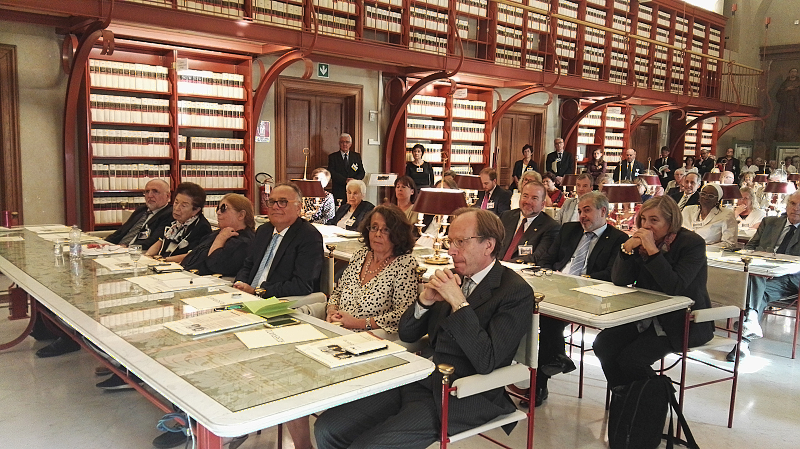 The event saw the participation of members of the Italian parliament and the European Parliament, ambassadors, teachers, academics and many people who knew Giordani also through his writings. Promoted by the Focolare Movement with the Chiara Lubich Center, Igino Giordani Center and the political Movement for unity, for years now universities of the five continents, associations and local entities, have been supporting and sharing the fundaments of the cultural, social and political project, which are based on the vital encounter between Chiara Lubich and Giordani. We can thus say that the meeting in Rome was the expression of a long partnership and synergy amongst many. Upon opening the convention, Donato Falmi, Co-Director of the Focolare in Rome, read the greeting and message of the President of the Italian Republic to the Focolare President, Maria Voce: “…in expressing my appreciation for this initiative, aimed at nurturing the example of men and women who worked to promote the universal values of peace, brotherhood and solidarity, President Mattarella is conveying to you and the entire Focolare Movement, his best regards and greetings.” “I had the fortune of meeting Igino Giordani because in my youth,” affirmed Steni Di Piazza, Senator of Palermo. “I met the young people of the Focolare, and attended educational congresses with them. In July 1979, I met Igino Giordani and he told me that when he met Chiara, he felt something new. After many years I understood that with that phrase, Giordani was referring to politics in the fraternal cooperation and dignity of all the members. And maybe the vocation to politics began to grow in me after that meeting with Igino.” “This is a good moment to discuss and commemorate that 18 September of 70 years ago, in order to try to highlight those values that marked such an occasion,” underlined Stefano Fassina, Congressman of Rome. “Politics as a vocation should be felt and lived by every citizen, since every citizen is called to be responsible for the public good.”
The event saw the participation of members of the Italian parliament and the European Parliament, ambassadors, teachers, academics and many people who knew Giordani also through his writings. Promoted by the Focolare Movement with the Chiara Lubich Center, Igino Giordani Center and the political Movement for unity, for years now universities of the five continents, associations and local entities, have been supporting and sharing the fundaments of the cultural, social and political project, which are based on the vital encounter between Chiara Lubich and Giordani. We can thus say that the meeting in Rome was the expression of a long partnership and synergy amongst many. Upon opening the convention, Donato Falmi, Co-Director of the Focolare in Rome, read the greeting and message of the President of the Italian Republic to the Focolare President, Maria Voce: “…in expressing my appreciation for this initiative, aimed at nurturing the example of men and women who worked to promote the universal values of peace, brotherhood and solidarity, President Mattarella is conveying to you and the entire Focolare Movement, his best regards and greetings.” “I had the fortune of meeting Igino Giordani because in my youth,” affirmed Steni Di Piazza, Senator of Palermo. “I met the young people of the Focolare, and attended educational congresses with them. In July 1979, I met Igino Giordani and he told me that when he met Chiara, he felt something new. After many years I understood that with that phrase, Giordani was referring to politics in the fraternal cooperation and dignity of all the members. And maybe the vocation to politics began to grow in me after that meeting with Igino.” “This is a good moment to discuss and commemorate that 18 September of 70 years ago, in order to try to highlight those values that marked such an occasion,” underlined Stefano Fassina, Congressman of Rome. “Politics as a vocation should be felt and lived by every citizen, since every citizen is called to be responsible for the public good.” 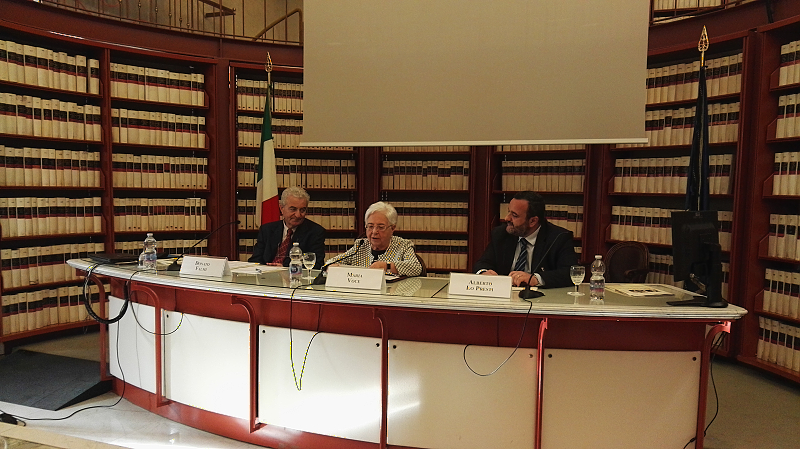 Going back to 18 September 1948, Giordani recounts the meeting with Chiara in his Memoirs: “I felt something new in the first words of that young lady. There was a note of deep and secure conviction which arose from a supernatural sentiment. So suddenly my curiosity was aroused and a fire inside me started to burn…” In that encounter Chiara brought with her the Ideal of unity. “She simply spoke about the divine adventure that had started a few years earlier in Trent, which already triggered the birth of a new Christian community,” Maria Voce affirmed in her speech. “From the beginning, the first focolare women and then the men, nurtured themselves on the Light of this Ideal, as also Igino Giordani, who Chiara spiritually fed through a prolific correspondence.” In the era of Catholic politics, Giordani was a leader. He not only worked in the Parliament but also in the Vatican. But the meeting with Chiara transformed him deeply. “He discovered unity in a new way, as the principle and value of human relationships, especially in politics,” stated the political scientist, Alberto Lo Presti. “That is, he understood that all the partial truths he had believed were decisive in doing good politics, were fulfilled in unity. (…) Unity is the banner of his political vocation.” Rocco Pezzimenti, Professor of the History of political doctrines in the Lumsa University of Rome reminds us of Giordani’s two publications: the first, published in 1949 entitled Dehumanism and the second, published in the 1960s, entitled The Two Cities, both of rare and also prophetic depth. Giordani clearly says that from St. Augustine, he acquired a fundamental characteristic: politics is not an improvised event. What occurs in politics is first developed interiorly.” “If there is a theme we should reflect on today, starting from that encounter between Igino and Chiara,” recalled Marina Sereni, former vice president of the House of Representatives – “it is precisely unity in politics today. And politics is a vocation if it centers on the Common Good, with those values which are not the property of one party, but which target unity.” Her words were shared by Beatrice Lorenzin, former Minister for Health, who affirmed how “Igino and Chiara were two masters in the history of the Italian Republic and who initiated something extraordinary. We need these reference points to help us make a dynamic and not hypocritical analysis.” Lastly, four testimonials. “The first time I heard about Giordani was in the summer of 1946,”recalls Congresswoman, Rosa Russo Iervolino, “when my parents were elected in the constituent assembly. Giordani’s interventions in the chamber were always respectful of the others but at the same time harsh in making the truth emerge. Giordani was so humble that his humility almost hid his intelligence which was dynamic and always popped up in other ways.”
Going back to 18 September 1948, Giordani recounts the meeting with Chiara in his Memoirs: “I felt something new in the first words of that young lady. There was a note of deep and secure conviction which arose from a supernatural sentiment. So suddenly my curiosity was aroused and a fire inside me started to burn…” In that encounter Chiara brought with her the Ideal of unity. “She simply spoke about the divine adventure that had started a few years earlier in Trent, which already triggered the birth of a new Christian community,” Maria Voce affirmed in her speech. “From the beginning, the first focolare women and then the men, nurtured themselves on the Light of this Ideal, as also Igino Giordani, who Chiara spiritually fed through a prolific correspondence.” In the era of Catholic politics, Giordani was a leader. He not only worked in the Parliament but also in the Vatican. But the meeting with Chiara transformed him deeply. “He discovered unity in a new way, as the principle and value of human relationships, especially in politics,” stated the political scientist, Alberto Lo Presti. “That is, he understood that all the partial truths he had believed were decisive in doing good politics, were fulfilled in unity. (…) Unity is the banner of his political vocation.” Rocco Pezzimenti, Professor of the History of political doctrines in the Lumsa University of Rome reminds us of Giordani’s two publications: the first, published in 1949 entitled Dehumanism and the second, published in the 1960s, entitled The Two Cities, both of rare and also prophetic depth. Giordani clearly says that from St. Augustine, he acquired a fundamental characteristic: politics is not an improvised event. What occurs in politics is first developed interiorly.” “If there is a theme we should reflect on today, starting from that encounter between Igino and Chiara,” recalled Marina Sereni, former vice president of the House of Representatives – “it is precisely unity in politics today. And politics is a vocation if it centers on the Common Good, with those values which are not the property of one party, but which target unity.” Her words were shared by Beatrice Lorenzin, former Minister for Health, who affirmed how “Igino and Chiara were two masters in the history of the Italian Republic and who initiated something extraordinary. We need these reference points to help us make a dynamic and not hypocritical analysis.” Lastly, four testimonials. “The first time I heard about Giordani was in the summer of 1946,”recalls Congresswoman, Rosa Russo Iervolino, “when my parents were elected in the constituent assembly. Giordani’s interventions in the chamber were always respectful of the others but at the same time harsh in making the truth emerge. Giordani was so humble that his humility almost hid his intelligence which was dynamic and always popped up in other ways.” 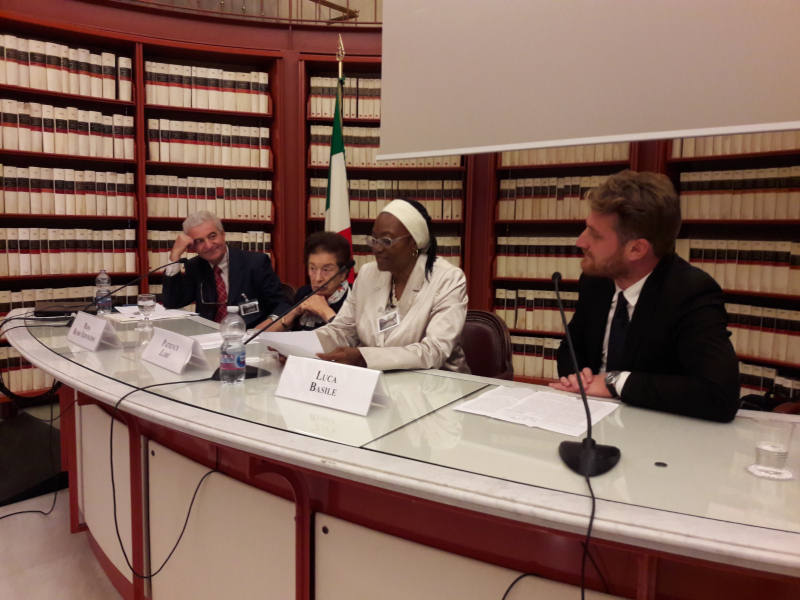 The following intervention was by Patience Lobe, first Cameroon woman to have been appointed in the Ministry as the Director of Public Works: “From the Focolare spirituality I learned coherence between life and words, and the importance of loving and serving the others. Having Chiara, a woman, as a model, gave me strength and courage, without ever making compromises. Chiara has opened my soul and intelligence to the Gospel.” To conclude, Luca Basile, President of the Town Council of Arzano in the province of Naples: “Thanks to the Focolare, I was able to live important experiences like cultural exchange and using it as a stimulus to my political commitment in the territory. My two predecessors resigned because the town council was dissolved due to mafia infiltration. You can fully understand how difficult it is to operate in such a territory, but we cannot lose hope when we have Chiara and Igino as our models.” “To implement what was generated from the encounter between Chiara Lubich and Giordani, we need to take upon us what the Country and humanity are going through,” affirmed Letizia De Torre, international coordinator of the Movement for Unity in Politics (MPPU). “May our commitment, imbued with the charism of Chiara Lubich, offer in a complex world, amazing possibilities for unity.” Lorenzo Russo
The following intervention was by Patience Lobe, first Cameroon woman to have been appointed in the Ministry as the Director of Public Works: “From the Focolare spirituality I learned coherence between life and words, and the importance of loving and serving the others. Having Chiara, a woman, as a model, gave me strength and courage, without ever making compromises. Chiara has opened my soul and intelligence to the Gospel.” To conclude, Luca Basile, President of the Town Council of Arzano in the province of Naples: “Thanks to the Focolare, I was able to live important experiences like cultural exchange and using it as a stimulus to my political commitment in the territory. My two predecessors resigned because the town council was dissolved due to mafia infiltration. You can fully understand how difficult it is to operate in such a territory, but we cannot lose hope when we have Chiara and Igino as our models.” “To implement what was generated from the encounter between Chiara Lubich and Giordani, we need to take upon us what the Country and humanity are going through,” affirmed Letizia De Torre, international coordinator of the Movement for Unity in Politics (MPPU). “May our commitment, imbued with the charism of Chiara Lubich, offer in a complex world, amazing possibilities for unity.” Lorenzo Russo
Sep 26, 2018 | Non categorizzato
The International Day established by the UN in 2013 reminds us of the necessity to totally eliminate nuclear weapons, to achieve the fundamental objective of peace and security. Atomic weapons, in fact, continue to represent an unacceptable menace to the world population. The date chosen by the UN recalls the evening of 26 September 1983, when the Soviet Colonel, Stanislav Petrov decided correctly, to retain as an error, the missile alarms from the Unites States that appeared on the screens, despite the contrary opinion of the technicians. Petrov chose, in the span of a few minutes, to not follow the procedure that would have led to the reaction of the Soviet Union with the launching of its own atomic bombs. The man who saved the world from a real nuclear holocaust, died in absolute anonymity in 2017, in a town not far from Moscow.
Sep 25, 2018 | Non categorizzato
A cloudy and humid day, and a sensation of emptiness. Only the day before I had celebrated my birthday, and made an ambitious wish: do all I can to make the new year shine as never before, imbuing each thing with love. I knew I would have had to start over again a thousand times, but I wanted to give my utmost. It was a sign of gratitude to Jesus for the gift of life. Not an isolated gift, but an intention valid for the entire year. He himself would have helped me. And yet, while going to an appointment, I felt that the cloudy sky was also inside me. I had allowed to silently creep into my heart a judgment of a brother who had once again disappointed me. It didn’t matter whether I was right or not. Inside me, charity was missing. I felt it with pain and I asked myself how I had gotten to that point. I came across a boy I often met. Dirty, stinky, with the usual bottle in hand. He was barefoot and shivering from the cold. He looked at me without a word. I greeted him courteously, thinking that in that way I was doing all I could, and continued my path. In that moment the Parable of the Good Samaritan came to mind. “Am I also like that Pharisee? Or do I let myself be challenged by that boy’s countenance of abandonment? I took off my sweater and went back. “Do you feel cold? “Yes, very” he answered. “Try on my sweater, let’s see if it fits.” He was so bewildered, but I almost didn’t dare touch him, since his hands really needed a good wash. “C’mon, try it on.” The size was perfect and his face seemed like that of a child on Christmas Eve. I greeted him and continued along my way, certainly feeling a bit cold, but happy. While waiting to meet my friend, a subtle voice spoke inside me. “What you did was nice, but what about that judgment you have?” “But Jesus – I answered – that person may not even have noticed it….” “But I did notice, I was in him.” One by one the arguments and excuses that came to mind were erased. Going home I decided to call him. A serene conversation, without any hard feeling on his part. Full unity was re-established, even if, to tell the truth, something inside me had snapped. A great, unmistakable peace invaded me. Two hours later, the doorbell rang. It was a dear friend, returning from his hometown with a gift for my birthday: a sweater! It was Jesus who was saying: “Raise the stakes!” From: “La vida se hace camino”, Urs Kerber, Ciudad Nueva Ed., Buenos Aires 2016, pp 41-42


 “Whatever you did to one of the least of these brothers and sisters of mine, you did it to me” (Mt 26:40). This sentence from the Gospel is the most definitive word on what a human being is. This definition is no less scandalous than Jesus declaring himself Son of God. In the name of their personal freedom, identity and uniqueness, human beings think that they have a right to contest the fact that they are so identified with Jesus Christ. Human beings want to be loved for themselves, for who they are, and not to be degraded as some sort of mask for Jesus. Human beings fear that the “bit more” of love that they receive out of love for Jesus might not take them into account, might rob them of the love they need and desire for themselves. But who could neglect their neighbours while trying to love Jesus in them (and in this way also neglect Jesus)? And who could claim that acknowledging the presence of Jesus in others means diminishing their human dignity; in that case they have not understood the presence of Jesus in their neighbours. Since Jesus has identified himself with humankind – God himself who is Love – he has also identified himself with every individual human being. But love is never an affirmation of oneself that consumes and annihilates others. It’s something that gives of itself, and, in its self-giving, provides others with the freedom to be themselves. Jesus never leaves me alone. He is on my side, he accepts me just as I am, and whatever concerns me, also concerns Him. I remain myself. Indeed, I become my fullest self precisely because I never remain alone. The mystery of Christ is the mystery of every human being. What does this mean for the people I meet, and what does it mean for me and my life? For what regards other people, it means that I am never dealing merely with a link in the chain, a cog in the wheel, or just a number in the huge numbers of people that exist. Each time I look upon a human face, I meet God in his unconditioned state, I encounter that voice that still declares over the face of every human being, what was said of Jesus during the Transfiguration on that mountaintop: “This is my beloved son!” (Mk 9:7). There are no exceptions… A human cannot rob itself of its ultimate reality. Whether he is a criminal or a scoundrel, I can never again write him off as a lost case. I encounter Christ in every person not because the person is good or deserving, not even because he or she draws upon the divine light in their personal lives, but because God has irrevocably adopted them as his own sons and daughters. Certainly the human being is immense because of the Divine life that he and she have let into their souls because of their personal choice to believe, which took place in baptism in the name of Jesus. Belonging to Jesus is something “automatic.” When a person is born, Christ has already assumed into himself that person’s living and dying, fault and self-inflicted wounds: everything is assumed into the life and death of Christ who gave his life for each one of us. This is why we encounter Jesus in every human being. And we encounter him in a particular way in the least, in those who seem to be farthest from Him, in the people in whom his face seems to be most overshadowed. Why? Because on the cross, during his abandonment by God, even becoming sin (2 Cor 5:21), Jesus identified himself with what is farthest from God, what seems most opposed to God. [It is only by] discovering Christ in our neighbours and giving to each of them that human love with which you turn towards every neighbour, with an indivisible love that is therefore directed to Christ himself, that will enable every neighbour to discover his and her own identity with Jesus, their own nearness to Jesus, being completely assumed by Him.” (From “Offene Weltformel”, by
“Whatever you did to one of the least of these brothers and sisters of mine, you did it to me” (Mt 26:40). This sentence from the Gospel is the most definitive word on what a human being is. This definition is no less scandalous than Jesus declaring himself Son of God. In the name of their personal freedom, identity and uniqueness, human beings think that they have a right to contest the fact that they are so identified with Jesus Christ. Human beings want to be loved for themselves, for who they are, and not to be degraded as some sort of mask for Jesus. Human beings fear that the “bit more” of love that they receive out of love for Jesus might not take them into account, might rob them of the love they need and desire for themselves. But who could neglect their neighbours while trying to love Jesus in them (and in this way also neglect Jesus)? And who could claim that acknowledging the presence of Jesus in others means diminishing their human dignity; in that case they have not understood the presence of Jesus in their neighbours. Since Jesus has identified himself with humankind – God himself who is Love – he has also identified himself with every individual human being. But love is never an affirmation of oneself that consumes and annihilates others. It’s something that gives of itself, and, in its self-giving, provides others with the freedom to be themselves. Jesus never leaves me alone. He is on my side, he accepts me just as I am, and whatever concerns me, also concerns Him. I remain myself. Indeed, I become my fullest self precisely because I never remain alone. The mystery of Christ is the mystery of every human being. What does this mean for the people I meet, and what does it mean for me and my life? For what regards other people, it means that I am never dealing merely with a link in the chain, a cog in the wheel, or just a number in the huge numbers of people that exist. Each time I look upon a human face, I meet God in his unconditioned state, I encounter that voice that still declares over the face of every human being, what was said of Jesus during the Transfiguration on that mountaintop: “This is my beloved son!” (Mk 9:7). There are no exceptions… A human cannot rob itself of its ultimate reality. Whether he is a criminal or a scoundrel, I can never again write him off as a lost case. I encounter Christ in every person not because the person is good or deserving, not even because he or she draws upon the divine light in their personal lives, but because God has irrevocably adopted them as his own sons and daughters. Certainly the human being is immense because of the Divine life that he and she have let into their souls because of their personal choice to believe, which took place in baptism in the name of Jesus. Belonging to Jesus is something “automatic.” When a person is born, Christ has already assumed into himself that person’s living and dying, fault and self-inflicted wounds: everything is assumed into the life and death of Christ who gave his life for each one of us. This is why we encounter Jesus in every human being. And we encounter him in a particular way in the least, in those who seem to be farthest from Him, in the people in whom his face seems to be most overshadowed. Why? Because on the cross, during his abandonment by God, even becoming sin (2 Cor 5:21), Jesus identified himself with what is farthest from God, what seems most opposed to God. [It is only by] discovering Christ in our neighbours and giving to each of them that human love with which you turn towards every neighbour, with an indivisible love that is therefore directed to Christ himself, that will enable every neighbour to discover his and her own identity with Jesus, their own nearness to Jesus, being completely assumed by Him.” (From “Offene Weltformel”, by 





 The following intervention was by Patience Lobe, first
The following intervention was by Patience Lobe, first